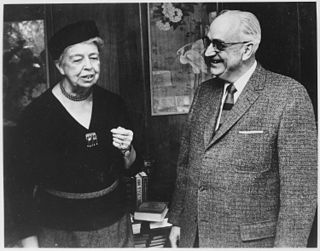A Quote by Agnes Repplier
There is an optimism which nobly anticipates the eventual triumph of great moral laws, and there is an optimism which cheerfully tolerates unworthiness.
Related Quotes
There are really two kinds of optimism. There's the complacent, Pollyanna optimism that says "don't worry - everything will be just fine" and that allows one to just lay back and do nothing about the problems around you. Then there's what we call dynamic optimism. That's an optimism based on action.
There are really two kinds of optimism. There's the complacent, Pollyanna optimism that says, 'Don't worry - everything will be just fine,' and that allows one to just lay back and do nothing about the problems around you. Then there's what we call dynamic optimism. That's an optimism based on action.
Christian optimism is not a sugary optimism, nor is it a mere human confidence that everything will turn out all right. It is an optimism that sinks its roots into an awareness of our freedom, and the sure knowledge of the power of grace. It is an optimism that leads us to make demands on ourselves, to struggle to respond at every moment to God's call.
Those people who say that America is finite are some sense right. The environmental movement, for example, has a great wisdom to it: we need to protect, to preserve, to shelter as much as we need to develop. But I think this always has to be juxtaposed against the optimism of old, which is now represented in part by immigrants. I would like to see America achieve a kind of balance between optimism and tragedy, between possibility and skepticism.
But black folks have never really been optimists. We've been prisoners of hope, and hope is qualitatively different from optimism in the way that there's a difference between The Blues and Lawrence Welk. The Blues and Jazz have to do with hope while the other is sugarcoated music which has to do with sentimental optimism.
Many of the most successful men I have known have never grown up. They have retained bubbling-over boyishness. They have relished wit, they have indulged in humor. They have not allowed ‘dignity’ to depress them into moroseness. Youthfulness of spirit is the twin brother of optimism, and optimism is the stuff of which American business success is fashioned. Resist growing up!
My real problem was certainly decisions I made, and the optimism that I had in making them. Y'know, I mean, I lived within this kind of nimbus of optimism, that, no matter what I encountered, I would always overcome it. Well, optimism can be your worst enemy as well as your best friend, but the other side of this is, that, y'know, expenses grow. But our incomes have not.
Nietzsche inveighs against every sort of historical optimism; but he energetically repudiates the ordinary pessimism, which is the result of degenerate or enfeebled instincts of decadence. He preaches with youthful enthusiasm the triumph of a tragic culture, introduced by an intrepid rising generation, in which the spirit of ancient Greece might be born again. He rejects the pessimism of Schopenhauer, for he already abhors all renunciation; but he seeks a pessimism of healthiness, one derived from strength, from exuberant power, and he believes he has found it in the Greeks.





































